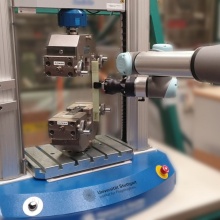Lightweight components, for example made from new steel alloys or plastics, are key to energy-efficient and low-emission vehicles. Reliable and precise simulation methods are essential for their development. Transferring existing material models to new and complex materials however requires a lot of time and experience. In order to speed up the calculations, the new research project AIMM (Artificial Intelligence for Material Models) is now focusing on machine learning methods. The Institute of Aircraft Design (IFB) and the Institute for Metal Forming Technology (IFU) are involved in the project on behalf of the University of Stuttgart.
In order to find out whether a car or an airplane can withstand a crash, the behavior of the materials used such as metals and plastics are evaluated in computer simulations under a variety of conditions. This evaluation is carried out using computer programs which often integrate hundreds of models in order to describe the behavior of the different materials. If you want to use a new material, one of the existing models is adapted to the new data. However, it takes a lot of experience where necessary, to know which model to choose and how to further develop the equations which the model is based on. “It’s very time-intensive”, explains Daniel Sommer from the IFB, who runs the project at the University of Stuttgart. “In industry though, a new material should be made into a model and ultimately be ready for production very quickly.”
In order to speed up the process, the project partners want to supplement or replace the traditional model-based material description with an alternative, data-driven material model. The models should be trained using machine learning methods in future instead of equations, so that they can learn how a material behaves from the existing models and can more-or-less calibrate themselves.
Focus of the IFB: plastics
The IFB’s first task is to create the process chain of a methodology for describing plastics in simulation by means of machine learning, whereby the focus is on developing and validating the machine learning models for plastic. The institute also contributes some of the known fundamentals such as traditional material characterization and modeling. Another important building block here is automating the testing technology for the purpose of generating real training data for plastics, which act as a learning experience for artificial intelligence through optimized characterization tests. Collaborative robot systems are combined with state-of-the-art measuring technology for this purpose, and the data for machine learning is provided.
“The intelligent expansion of material modeling in computer-aided engineering (CAE) through the use of machine learning, particularly in combination with automated testing technology for real-life learning is both a challenge and an opportunity in equal measure”, says the Head of the IFB Prof. Peter Middendorf. “Thanks to the material description expertise at the IFB and our first applications of artificial intelligence in CAE and measuring technology, the time-intensive and cost-intensive process should now be replaced by the approach envisaged in AIMM. We look forward to working together with such high-quality people in this consortium.”
Focus of the IFU: metals
Prof. Mathias Liewald, the Head of the Institute for Metal Forming Technology at the University of Stuttgart, is also happy about the ambitious project with the leading institutions in the field of material characterization at several universities in Germany, together with companies from the software industry, suppliers and the consortium leader Mercedes-Benz. The IFU will first characterize and model the forming behavior of metals in the traditional way. Simulative training data for the forming behavior is then collected and the interface between simulations and machine learning training algorithms is validated, and new characterization tests for forming behavior are designed especially for machine learning models.
“Our approach to the project is aimed towards significantly simplifying and accelerating the material behavior of steels and plastics to answer questions related to forming and crash simulations or the load-oriented design of future bodywork components with new and ambitious methods of artificial intelligence”, says Liewald.
About the AIMM consortium
AIMM is made up of the Ernst Mach Institute from the Fraunhofer Society, as well as the Institutes of Software Engineering and Theoretical Computer Science at the Technical University of Berlin and the Institute of Aircraft Design (IFB) and the Institute for Metal Forming Technology at the University of Stuttgart. The industrial companies involved in the consortium include Mercedes-Benz AG (consortium leader), as well as ElringKlinger, GOM, Renumics and Dynamore. AIMM receives 2.9 million euros in funding from the German Federal Ministry for Economic Affairs and Energy (BMWi), of which roughly 1 million euros goes to the institutes at the University of Stuttgart.
Expert Contact:
Daniel Sommer, University of Stuttgart, Institute of Aircraft Design, Tel: +49 711 685-69571, E-mail


